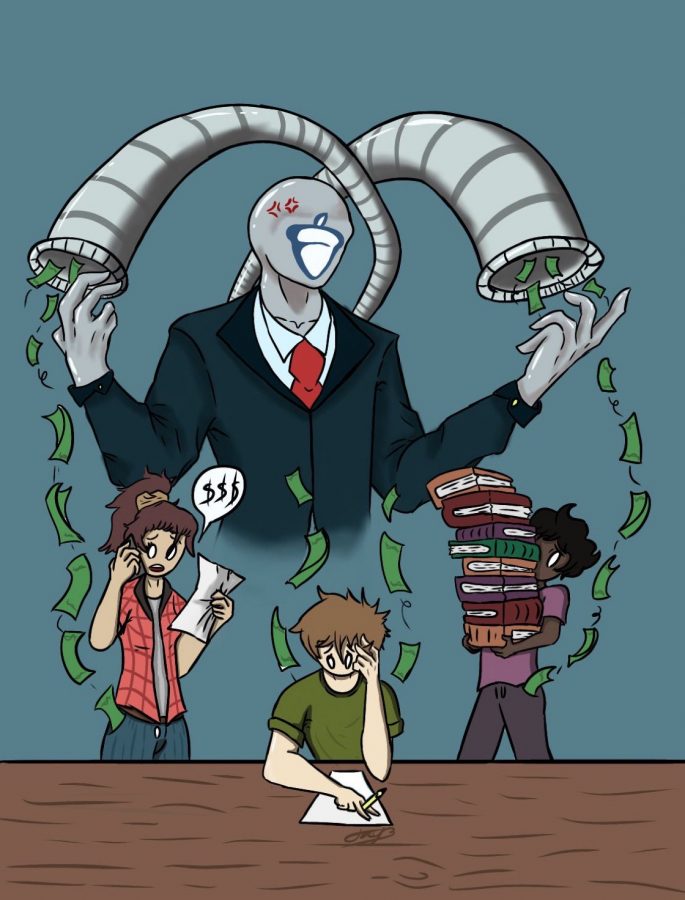CollegeBoard Exploits High Schoolers
May 10, 2020
Due to COVID-19 the remainder of the 2019-2020 school year has been cancelled, and in response CollegeBoard has decided to postpone SATs, ACTs, and modify AP tests. AP tests are now forty-five minutes long, and students are allowed to use notes. Modifying AP tests is not the only thing CollegeBoard has done as they’ve released numerous resources within days to aid students in studying for their exam(s).
This raises the question as to why these resources have not always been available? Furthermore, if the CollegeBoard has been depriving students of these resources, what other ways are they unfairly disadvantaging students?
Before we can examine how students are being exploited by CollegeBoard, we must first know what the CollegeBoard is. According to its website, the CollegeBoard, originally known as the College Entrance Examination Board, is a non-profit organization that is designed to connect students to higher education.
By claiming itself as non-profit, CollegeBoard isn’t legally obligated to pay taxes. In 2018, the most recent audit available, the CollegeBoard had over 1.15 billion dollars in cash and investments. According to IRS filings, the CollegeBoard dividend has gone from 4% to 14% meaning that after all expenses are deducted, they get to keep $4 to $14 per $100. This may not seem like a lot, but students pay roughly $100 for one AP exam or two SAT exams. The CollegeBoard ended up with $38 million that they put into investments, so as to increase profit Each year CollegeBoard’s profit increases exponentially.
Furthermore if the CollegeBoard was so focused on connecting students to higher education, then why are there additional fees on top of the SAT and ACT? One can understand that AP, SAT and ACT tests cost so much money as quality control standards rise exponentially, especially when trying to challenge the top students, and yet make it possible for other students to score well. Yet this does not explain the additional fees upon the ACT and SAT.
The SAT without an essay cost $47.50, and $64.50 with an essay. However most competitive colleges require SAT subjects tests which have a baseline for one test or a language subject test with a listening section at $26 and each additional subject test is $22. The ACT costs $50.50 without the writing segment and $67.00 with the writing segment. All of these costs are for one SAT or ACT test, and most students take each at least twice.
Students are also charged to send their scores to colleges and universities. Where among all of these fees and payments is the CollegeBoard helping students connect to higher education? It seems more so that the College Board is monopolizing upon a student’s desperation to get into a good college or university.
A perfect example of the exploitative nature of CollegeBoard is the 2019-2020 school year fall registration date for AP exams, rather than in the spring or late winter. The CollegeBoard stated that they did this to encourage students to study harder, but really it seems it was to trap students into paying for test(s) they may not even want to take by spring. If by spring a student decides they don’t want to take the exam, they have to pay a $45 fee to cancel it. How does this help students? It doesn’t. It helps the CollegeBoard.
These price tags further hinder socioeconomically disadvantaged students as it puts a financial strain on them, but many are able to apply for fee waivers. However not all students that don’t qualify for fee waivers can afford to spend hundreds of dollars on tests, oftentimes yearly. This increased financial strain often hinders students from taking as many tests as they wish, in the case of AP tests, or taking the test as many times as they wish, in the case of SATs and ACTs.
The CollegeBoard isn’t a non-profit organization that wants to help students reach higher education. It is a profiting organization under the guise of non-profit, that continues growing its dividend by exploiting the ambitions of high school students who cannot escape their only connection to higher education, the College Board.

